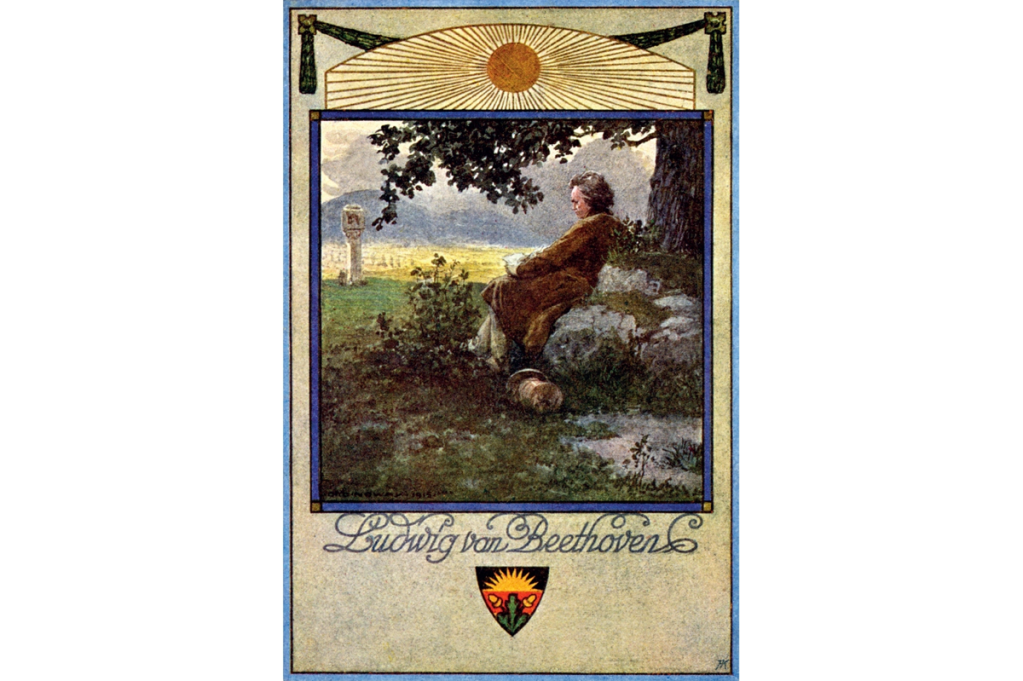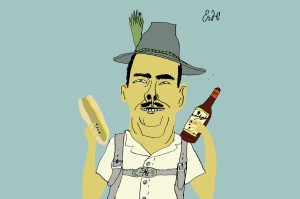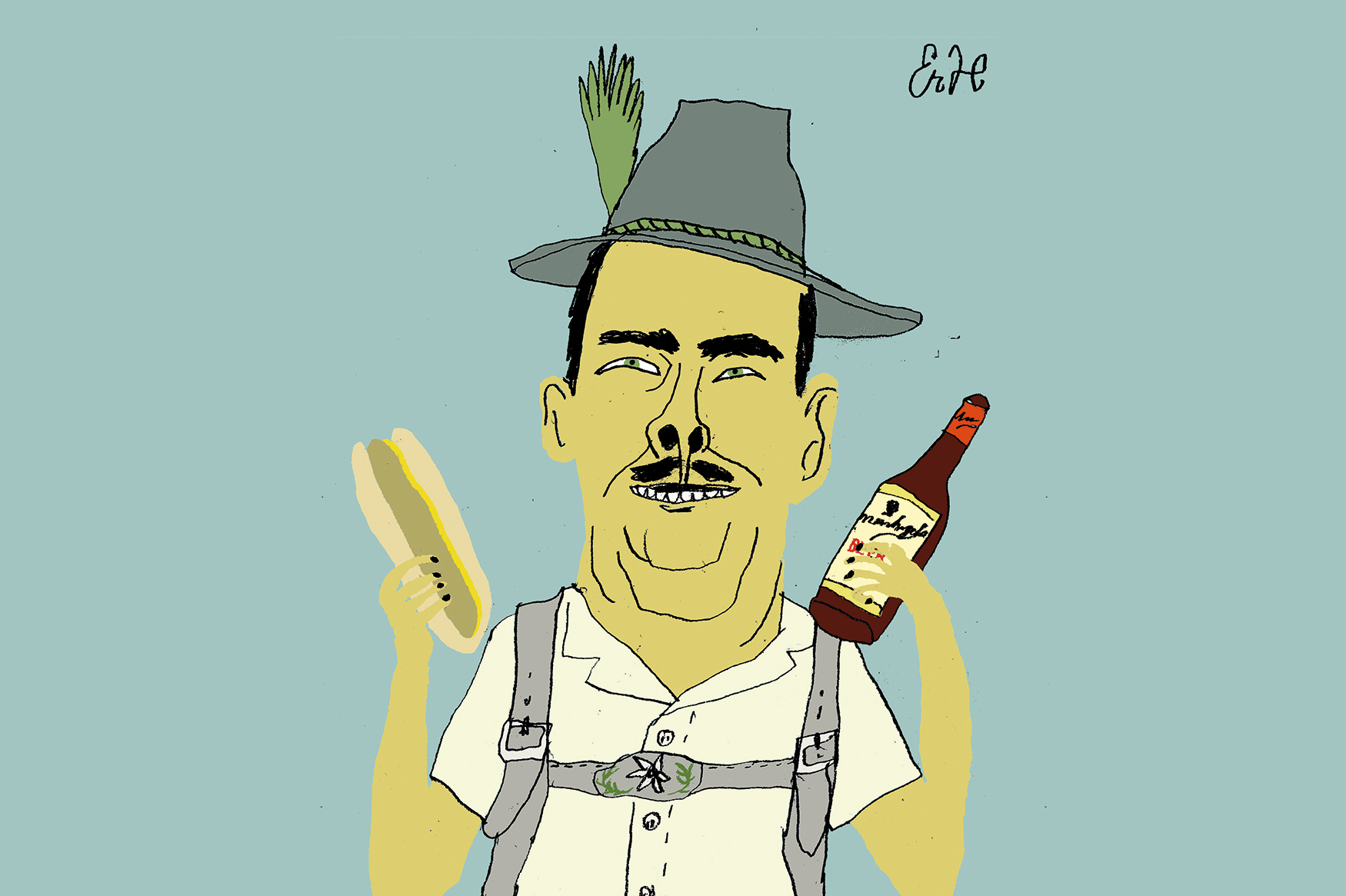I loved music before I could walk. It seemed I could harmonize anything my sisters were singing. I had perfect pitch, a mixed blessing since wrong notes made me cry.
I hated music when I first heard Beethoven’s Pastoral symphony.
I was nine years old. My mother had died when I was two and my father got remarried to a Hitler refugee, half unhinged by exile. My stepmother took me to orchestral concerts at London’s Royal Festival Hall. She liked all the crowd pleasers, best of all the Pastoral symphony which she played at home on a portable gramophone. I grew to revile the opening rustle of strings, the “Awakening of cheerful feelings on arrival in the countryside.”
That never worked for me. I’m not sure now whether Beethoven meant it either. Considered in the totality of Beethoven’s output, the Pastoral is a cuckoo in his catalog. Had it never been written, our view of him would not change. It was composed alongside the Fifth Symphony and Fourth Piano Concerto and premièred together in an overlong concert in December 1808. Both the other works reflect nervous times, Napoleon hammering at the gates of Vienna.
The Sixth, however, is sheer escapism, a springtime day evoked in deep midwinter and telling a story, which Beethoven never normally does. Here’s how it goes. Chap gets up in the morning, goes for a walk in a meadow. Sits down beside a brook. Watches a “Merry gathering of country folk” (Beethoven’s third movement title), looks up and sees a storm cloud. Finds shelter. Storm blows over. Chap admits to “Cheerful and thankful feelings.” Cliché? You said it. Banal? Absolutely. Surely not by Beethoven.
Research a little further and you’ll find more ambiguity. Beethoven left a note saying that his movement titles in the Pastoral are not to be taken literally. The symphony, he hedges, is “more expression than tone-painting.” He goes on to say (in a sketch now online at the British Library), “one leaves it to the listener to work out the situations.” Well, thanks for that, Ludwig.
Still, the brook babbles away, the bird trills and the thunder is meant to terrify. Beethoven is trying to have it both ways. He is not comfortable with this idyll of country life that he knows to be, at least in part, untrue and at odds with the brittle social and political situation of his times. He confesses to the anomaly. So what are we, as listeners, to make of it?
My initial aversion to the symphony was reinforced by my hated stepmother taking me on daylong rambles at the semi-inhabited end of the Metropolitan Line. John Betjeman may have extolled a “lost Elysium” around Ruislip and Amersham. For me, these stations portended sodden misery with a rucksack on my back. I left my Millets bootlaces untied in the hope of breaking an ankle. I failed geography at school so that I could not be made to decipher another plastic-wrapped Ramblers Association map.
Back home the Pastoral LP that my stepmother wore out on her Philips turntable was conducted by Bruno Walter. In her eyes, Walter was divine. While she was growing up in Munich, Walter was Generalmusikdirector — God, in a compound German noun.
Walter personified the impervious charm of the higher bourgeoisie. My picture files showed the chubby Walter expensively tailored, at a garden lunch with his neighbor Thomas Mann, clinking glasses with Arturo Toscanini, kissing hands with the Papal nuncio to Bavaria, the next Pope.
But I soon found feet of clay. Archives and oral memories showed up Bruno Walter as a sex pest who kept a mistress on tap and seduced — technically raped — his neighbor’s pubescent daughter. Forced into exile by the Nazis, Walter resumed his lotus life in a house near Mann’s on Pacific Palisades. The war over, he quickly whitewashed the Vienna Philharmonic of Nazi crimes and conducted them at the inaugural Edinburgh Festival in August 1947 in concerts that provided, for British audiences, formative readings of Beethoven’s Pastoral and Mahler’s Lied von der Erde. Up to his death in 1962, Walter was consulted as an oracle by rising conductors Georg Solti and Zubin Mehta.
Unpicking the human Walter was musically liberating for me. I listened to his Pastoral recording with a Hollywood orchestra and heard him adjusting — pandering, even — to the panoramic delusions of movie moguls and drive-in audiences. His is an exemplary recording, elegantly phrased and executed with a range of warmth and colors that only the most gifted of maestros can summon. It is also an object lesson in how music — specifically the Pastoral symphony — can be adjusted to wholly unrelated issues.
The philosopher Theodor Wiesengrund Adorno, a Pacific Palisades pal of Walter and Mann, came up with an intriguing exegesis. In preparatory notes for an unfinished, little-known book, Adorno argues that “Beethoven’s music is an image of that process which great philosophy understands the world to be. An image, therefore, not of the world but of an interpretation of the world.” What Adorno is saying is that everything Beethoven does in the Pastoral is at one remove from reality, a text that is also a commentary on itself.
To underpin his theory, Adorno demonstrates that in the finale of the Pastoral, when all appears to be heading for a happy ending, Beethoven generates out of the naivety of a shepherd’s song an extraordinary climactic tension, a “secret negativity.” Just listen to the closing pages in, for instance, Leonard Bernstein’s Vienna Philharmonic recording on YouTube. Nothing rings quite true and nobody goes home totally comfortable.
Adorno, for me, cracks the Pastoral enigma. If we accept his proposition that Beethoven delivers both text and subtext, narrative and analysis, we can make of the symphony whatever we like — whether a benign Sunday jaunt or a thunderous sermon against a world bent on self-destruction. We can both love the melodies and loathe the context.
Beethoven, finishing the work, is beset by that ‘secret negativity’ which prompts him to retract his original movement titles. He is conflicted about the work and doesn’t care who knows it. I picture him wondering if he hasn’t turned out a piece of travel journalism, a parody of country life, a rushed distortion of rural paradise. “Nothing,” he once said, “is more intolerable than having to admit to yourself your own errors.” In the Pastoral he lets us into that furtive admission. He adores country life and recoils from what he has made of it. In the end he allows us to choose between love and hate. In his words: “One leaves it to the listener to work it out.” In that permission, I made my peace with the Pastoral symphony. Beethoven is one of the few creators who looks at life from both sides — and never have we needed that gift more than now.
Why Beethoven by Norman Lebrecht is published by Pegasus on May 2. This article was originally published in The Spectator’s UK magazine. Subscribe to the World edition here.





















